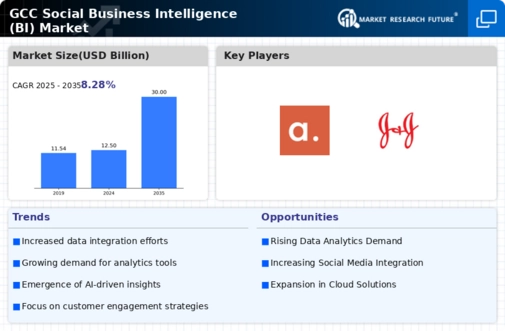Government Initiatives and Support
Government initiatives in the GCC region are playing a pivotal role in shaping the social business intelligence market. Various governments are actively promoting digital transformation and the adoption of advanced technologies, including business intelligence solutions. For instance, the UAE Vision 2021 and Saudi Vision 2030 emphasize the importance of data analytics in enhancing public services and driving economic diversification. These initiatives are likely to foster an environment conducive to the growth of the social business intelligence market, as public and private sectors collaborate to implement data-driven strategies. Furthermore, government support in the form of funding and incentives for technology adoption is expected to accelerate the integration of social business intelligence tools across various industries.
Increased Focus on Customer Experience
In the GCC social business intelligence market, there is an increasing emphasis on enhancing customer experience through data analytics. Businesses are recognizing that understanding customer behavior and preferences is crucial for maintaining a competitive edge. By utilizing social business intelligence tools, organizations can analyze customer interactions and feedback, leading to improved service delivery and personalized marketing strategies. Recent surveys indicate that companies investing in customer analytics are likely to see a 20% increase in customer satisfaction rates. This focus on customer-centric approaches is driving the demand for social business intelligence solutions, as businesses seek to leverage data to create more meaningful and engaging customer experiences.
Growing Importance of Social Media Insights
The growing importance of social media insights is reshaping the GCC social business intelligence market. With the proliferation of social media platforms, businesses are increasingly turning to social listening tools to gather insights about customer sentiment and market trends. This shift is driven by the realization that social media data can provide valuable information for strategic decision-making. Recent studies indicate that companies utilizing social media analytics are likely to experience a 30% improvement in their marketing effectiveness. As organizations in the GCC region strive to stay ahead of the competition, the integration of social media insights into business intelligence frameworks is becoming a critical component of their overall strategy.
Emergence of Advanced Analytics Technologies
The emergence of advanced analytics technologies is significantly influencing the GCC social business intelligence market. Technologies such as machine learning, natural language processing, and predictive analytics are becoming increasingly integrated into business intelligence solutions. These advancements enable organizations to analyze vast amounts of data more efficiently and derive actionable insights. As businesses in the GCC region seek to enhance their analytical capabilities, the adoption of these advanced technologies is expected to rise. Reports suggest that the market for advanced analytics in the GCC is set to grow by over 15% annually, reflecting the increasing reliance on sophisticated analytical tools to drive business strategies and improve operational performance.
Rising Demand for Data-Driven Decision Making
The GCC social business intelligence market is experiencing a notable surge in demand for data-driven decision making. Organizations across various sectors are increasingly recognizing the value of leveraging data analytics to enhance operational efficiency and strategic planning. According to recent statistics, the market for business intelligence solutions in the GCC is projected to grow at a compound annual growth rate of approximately 12% over the next five years. This growth is driven by the need for real-time insights and the ability to make informed decisions based on comprehensive data analysis. As businesses strive to remain competitive, the integration of social business intelligence tools becomes essential, enabling them to harness the power of data to drive innovation and improve customer engagement.












